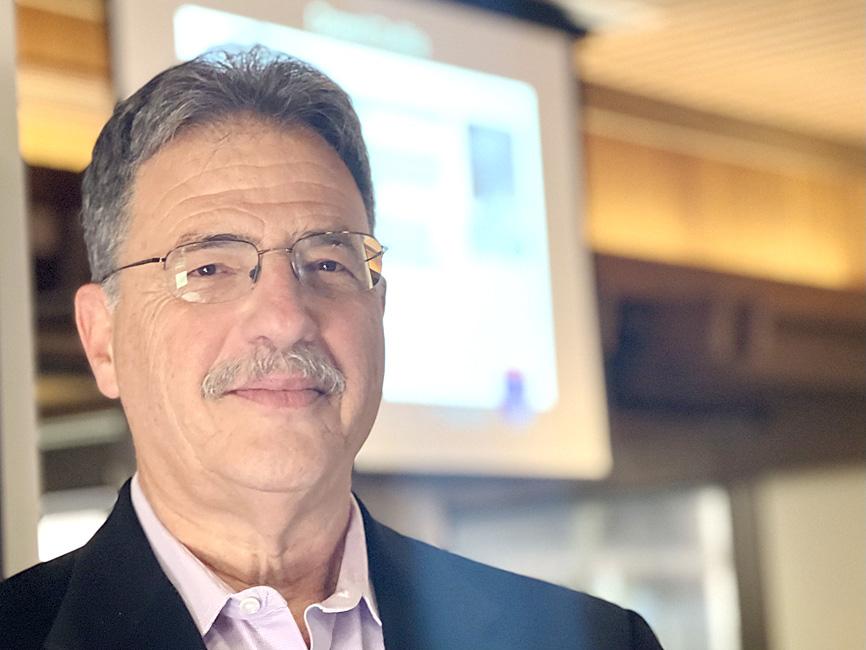Taiwan should learn from Ukraine’s creative communications with the world in the wake of Russia’s invasion, Hoover Institution senior fellow Larry Diamond said on Monday.
Diamond was speaking in San Francisco as part of a roundtable on China organized by the institution at Stanford University.
Ukraine in its response to the Russian invasion has adopted imaginative ways of communicating with the outside world, Diamond said.

Photo: CNA
For example, never before has the leader of a democratic nation spoken to another nation’s legislature while under siege as Ukrainian President Volodymyr Zelenskiy has done, he said, praising the novel use of videoconference technology.
Zelenskiy has spoken via videoconference with the European Parliament, the British parliament and US Congress, and plans to speak to the Japanese parliament today.
Scenes of courage and messages from Ukraine have touched hearts the world over, with Zelenskiy’s olive-green T-shirt becoming a symbol for the nation’s resistance, Diamond said.
In Taiwan’s case, although President Tsai Ing-wen (蔡英文) cannot formally visit the US for fear of enraging Beijing, Diamond said that it might be possible to hold talks via videoconference instead.
Considering that Taiwan already has a vibrant communications and social media landscape, Diamond said it could learn from Ukraine and anticipates dialogue once the conflict subsides.
As opposed to democratic leaders, autocratic rulers such as Russian President Vladimir Putin and Chinese President Xi Jinping (習近平) are “risk-takers,” Diamond said.
The world underestimated Putin’s willingness to take risks, but now everyone will know not to underestimate Xi, he said.
As for when Xi might act against Taiwan, Diamond predicted that “two to five years” is the most likely timeframe.
Xi is unlikely to make any aggressive moves until after he successfully extends his presidency and begins his new term, he said.
Meanwhile, former US national security adviser H.R. McMaster suggested that the US “do what it did not do” for Ukraine in 2014 and ensure that Taiwan has the defense capabilities it needs.
He is concerned about two upcoming dates: this autumn, when the Chinese Communist Party holds its 20th Congress, and in 2025, when its advanced weapons systems are expected to enter service.

Nipah virus infection is to be officially listed as a category 5 notifiable infectious disease in Taiwan in March, while clinical treatment guidelines are being formulated, the Centers for Disease Control (CDC) said yesterday. With Nipah infections being reported in other countries and considering its relatively high fatality rate, the centers on Jan. 16 announced that it would be listed as a notifiable infectious disease to bolster the nation’s systematic early warning system and increase public awareness, the CDC said. Bangladesh reported four fatal cases last year in separate districts, with three linked to raw date palm sap consumption, CDC Epidemic Intelligence

Two Taiwanese prosecutors were questioned by Chinese security personnel at their hotel during a trip to China’s Henan Province this month, the Mainland Affairs Council (MAC) said yesterday. The officers had personal information on the prosecutors, including “when they were assigned to their posts, their work locations and job titles,” MAC Deputy Minister and spokesman Liang Wen-chieh (梁文傑) said. On top of asking about their agencies and positions, the officers also questioned the prosecutors about the Cross-Strait Joint Crime-Fighting and Judicial Mutual Assistance Agreement, a pact that serves as the framework for Taiwan-China cooperation on combating crime and providing judicial assistance, Liang

Reports of Taiwanese going missing, being detained or interrogated, or having their personal liberties restricted in China increased about fourfold annually last year, the Mainland Affairs Council (MAC) said yesterday. Last year, 221 Taiwanese who traveled to China were reported missing, were detained and interrogated, or otherwise had their personal freedom restricted, up from 55 the previous year, the council said. Reopening group tours to China would be risky, as it would leave travelers with no way to seek help through official channels after Beijing shut down dialogue between the associations tasked with handling cross-strait tourism, the MAC said. Taipei’s Taiwan Strait Tourism

SHIFT: Taiwan is evolving from a transit stop into a tourist destination, with more international travelers willing to spend on tours, dining and cultural activities Taiwan rose three places in the World Tourism Barometer to 36th globally in 2024, with international tourism revenue of US$10.028 billion, the Tourism Administration said on Monday. The UN Tourism Organization publication said that its focus has switched from whether a country has returned to pre-COVID-19 levels of tourism to the amount spent by a tourist during an overseas trip. The nation last year welcomed 8.57 million international tourists, about 9 percent more than in 2024, with most tourists coming from Japan, South Korea, and Hong Kong and Macau, all of which accounted for at least 1 million tourists each. During the first